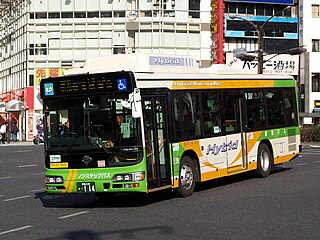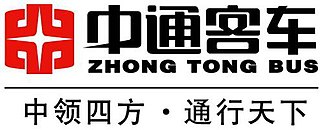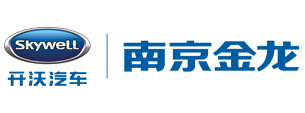Iveco S.p.A., an acronym for Industrial Vehicles Corporation, is an Italian multinational transport vehicle manufacturing company with headquarters in Turin, Italy. It designs and builds light, medium, and heavy commercial vehicles. The name IVECO first appeared in 1975 after a merger of Italian, French, and German brands. Its production plants are in Europe, China, Russia, Australia and Latin America and it has about 5,000 sales and service outlets in over 160 countries. The worldwide output of the company amounts to around 150,000 commercial vehicles with a turnover of about €10 billion.

A Natural Gas Vehicle (NGV) utilizes compressed natural gas (CNG) or liquefied natural gas (LNG) as an alternative fuel source. Distinguished from autogas vehicles fueled by liquefied petroleum gas (LPG), NGV's rely on methane combustion, resulting in cleaner emissions due to the removal of contaminants from the natural gas source.

The Mercedes-Benz Citaro is a single-decker, rigid or articulated bus manufactured by Mercedes-Benz/EvoBus. Introduced in 1997, the Citaro is available in a range of configurations, and is in widespread use throughout Europe and parts of Asia, with more than 55,000 produced by December 2019.
BYD Auto Co., Ltd. is the main automotive subsidiary and brand of BYD Company, a publicly listed Chinese multinational manufacturing company. It manufactures passenger battery electric vehicles (BEVs) and plug-in hybrid electric vehicles (PHEVs), collectively known as new energy vehicles (NEVs) in China. It also produces electric buses and trucks.

Van Hool NV is a Belgian coachbuilder and manufacturer of buses, coaches, trolleybuses, and trailers.

Yutong is a Chinese manufacturer of commercial vehicles, especially electric buses, headquartered in Zhengzhou, Henan. Yutong also has businesses in construction machinery, real estate, and other investments. As of 2016 it was the largest bus manufacturer in the world by sales volume.

An electric bus is a bus that is propelled using electric motors, as opposed to a conventional internal combustion engine. Electric buses can store the needed electrical energy on board, or be fed mains electricity continuously from an external source such as overhead lines. The majority of buses using on-board energy storage are battery electric buses, where the electric motor obtains energy from an onboard battery pack, although examples of other storage modes do exist, such as the gyrobus that uses flywheel energy storage. When electricity is not stored on board, it is supplied by contact with outside power supplies, for example, via a current collector, or with a ground-level power supply, or through inductive charging.

A hybrid electric bus is a bus that combines a conventional internal combustion engine propulsion system with an electric propulsion system. These type of buses normally use a Diesel–electric powertrain and are also known as hybrid Diesel–electric buses.

Zhongtong Bus Holding Co., Ltd. is a Chinese bus manufacturing company based in Liaocheng, Shandong Province. The company is listed on the Shenzhen Stock Exchange, and is one of China's major bus makers.

An alternative fuel vehicle is a motor vehicle that runs on alternative fuel rather than traditional petroleum fuels. The term also refers to any technology powering an engine that does not solely involve petroleum. Because of a combination of factors, such as environmental and health concerns including climate change and air pollution, high oil-prices and the potential for peak oil, development of cleaner alternative fuels and advanced power systems for vehicles has become a high priority for many governments and vehicle manufacturers around the world.
Environmental Performance Vehicles (EPV), previously DesignLine Corporation, is a manufacturer of coach, electric and range-extended electric (hybrid) buses. It was founded in Ashburton, New Zealand in 1985. Initially it was a manufacturer of tour coaches. In the 1990s it diversified into conventional transit buses and then added hybrid city buses in the late 1990s. It was acquired by American interests in 2006, and DesignLine Corporation's headquarters was relocated to Charlotte, North Carolina. Following a bankruptcy in 2013, the assets of DesignLine were sold and the company was renamed.

Higer Bus Company Limited, also known as Higer Bus, is a Chinese bus manufacturer based in Suzhou, Jiangsu province. It was established at the end of 1998. HIGER is China's leading exporter of buses and coaches, whose units are available in more than 100 countries and territories in South Asia, Middle East, Africa, Russia, East Europe and the Americas. In 2015, HIGER reached again a new breakthrough with more than RMB 11.7 billion sales revenue. Awarded with "China Top Brand", "National Inspection-free Product" and other honors, HIGER has made its way to China's Top 500 Most Valued Brands with a brand value of RMB14.492 billion, becoming the fastest growing company in China's bus industry, a base for exporting national finished automobiles and one of the Top 100 enterprises in informationalization in China.

A battery electric vehicle (BEV), pure electric vehicle, only-electric vehicle, fully electric vehicle or all-electric vehicle is a type of electric vehicle (EV) that exclusively uses chemical energy stored in rechargeable battery packs, with no secondary source of propulsion. BEVs use electric motors and motor controllers instead of internal combustion engines (ICEs) for propulsion. They derive all power from battery packs and thus have no internal combustion engine, fuel cell, or fuel tank. BEVs include – but are not limited to – motorcycles, bicycles, scooters, skateboards, railcars, watercraft, forklifts, buses, trucks, and cars.
Shenzhen BYD New Energy Co., Ltd., trading as Denza, is an automobile manufacturing company headquartered in Shenzhen, China, specialising in luxury electric cars and a joint venture between BYD Auto Industry and the Mercedes-Benz Group. Founded in May 2010, in late 2014 the company introduced its first model, the Denza EV. The car was initially put on sale in selected Chinese cities only. In late 2021, Denza underwent a restructuring as Mercedes-Benz reduced its share to 10%, while BYD held the rest.

The BYD K-series bus are a line of battery electric buses manufactured by the Chinese automaker BYD, powered with its self-developed lithium iron phosphate battery, featuring a typical operating range of 250 kilometres (160 mi) per charge under urban road conditions. It is available in several different nominal lengths, from 7.0 to 13.7 m and also as a 18 m (60 ft) (articulated) bus. The rear axle is powered by two electric traction motors; the battery capacity and motor power of each model varies depending on the nominal length and passenger capacity.

In China, the term new energy vehicle (NEV) is used to designate automobiles that are fully or predominantly powered by electric energy, which include plug-in electric vehicles — battery electric vehicles (BEVs) and plug-in hybrid electric vehicles (PHEVs) — and fuel cell electric vehicles (FCEV). The Chinese Government began implementation of its NEV program in 2009 to foster the development and introduction of new energy vehicles, and electric car buyers are eligible for public subsidies.

The Volvo 7900 is an integrally-constructed single-decker rigid bus and single-decker articulated bus, most commonly available as a hybrid electric bus named Volvo 7900 Hybrid or just Volvo 7900H, but is also available with both diesel and Compressed Natural Gas (CNG) engines in some markets. It is manufactured at Volvo's plant in Poland. It was introduced at Busworld Kortrijk 2011. Based on the Volvo 7900 Hybrid an extension is offered, which i.a. includes a roof-mounted device for occasional loading at stops. The manufacturer assumes that all buses at all end stations and also at some particularly busy stations stay a few minutes until the return or onward journey. As soon as a bus reaches an appropriately equipped stop, a loading unit attached to a pillar at the roadside lowers onto the coupling point mounted on the roof of the bus. The charging process ends as soon as the bus wants to continue or the battery is full. According to the manufacturer, this equipment allows compared to conventional hybrid buses significantly extending the travel time in electric mode and a reduction in fuel consumption. The vehicle and the charging system were first presented to the public in September 2014 at the International Motor Show.

Nanjing Golden Dragon Bus, also known as Nanjing Golden Dragon Skywell, is a Chinese manufacturing company established in 2000 in Nanjing. It produces vans, buses and commercial vehicles for the domestic and export markets. It is a subsidiary company under the Skywell New Energy Automobile Group, and a joint venture with the Xiamen King Long United Automotive Industry.
GreenWheel EV, full name Shenzhen Greenwheel Electric Vehicle Group Co., Ltd (深圳市陆地方舟新能源电动车集团有限公司)is a Chinese automobile manufacturer headquartered in Guangdong, China, that specializes in developing electric buses and low-speed electric vehicle or Neighborhood Electric Vehicles.



















